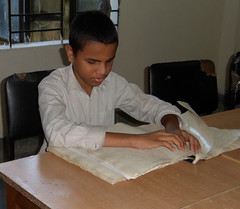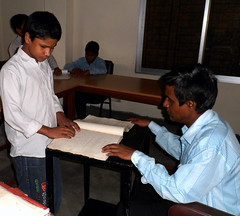2
In the midst of taking in the sights, sounds and smells of Dhaka, I was unsure how to begin writing. But as I become more accustomed to the utter chaos that is Dhaka, there is one thing I have not been able to get off of my mind: the fact that the most common disabilities seen in Bangladesh are very different from those seen in the United States.
The executive director of the Blind Education and Rehabilitation Development Organization (BERDO) became blind at age six when he contracted typhoid. Another one of BERDO’s staff members became ill with polio at a young age and has an underdeveloped lower body as a result of the disease. Disabilities of all types can be seen during a quick walk or rickshaw ride in this country. I am encouraged by the fact that Bangladesh made polio vaccines routine throughout the country in 1985 and that the disease was declared eradicated in Bangladesh in 2000. However, it’s re-emergence in Bangladesh in 2006 illustrates the great need for health care investment in this country. Unfortunately, typhoid remains endemic in Bangladesh as commercially available typhoid vaccines cost roughly $30 and are not effective in children less than two years of age.
Every time I walk around the streets of Dhaka I see a great need for the services that BERDO provides. On my first day of work, BERDO’s executive director, Saidul Huq, told me what it was like to go to school without Braille books or a Braille library to assist him with his studies. His unwavering resolve shines through as he describes his decision to found BERDO to provide disabled people with education, access to medical facilities and employment opportunities. His passion is apparent as he explains the need for BERDO’s talking library and the residential school for children who are visually impaired.
BERDO also provides computer training using talking software, free medical services that allow clients to access an M.B.B.S. doctor and eye specialist, and community-based rehabilitation programs. Additionally, the staff at BERDO works with governmental and business institutions to find appropriate employment opportunities for its clients. BERDO’s spirit of advocacy is manifested in its work to promote human rights of persons with disabilities in Bangladesh in partnership with the Center for Disability in Development.
Needless to say, I have my work cut out for me but am proud to be working for BERDO this summer and learning from all of the new experiences around me.
Posted By Amanda Lasik
Posted Jul 8th, 2011



